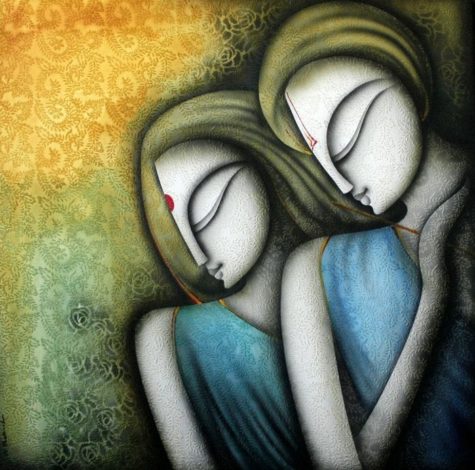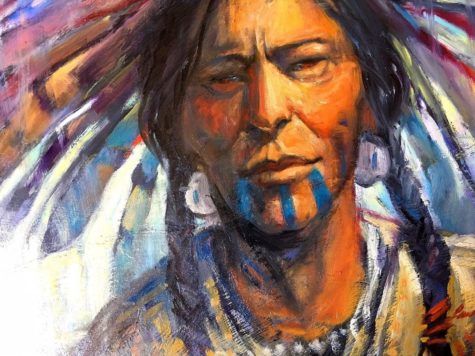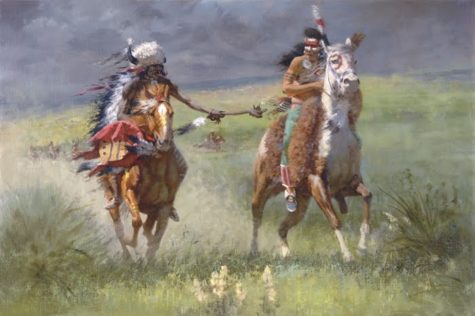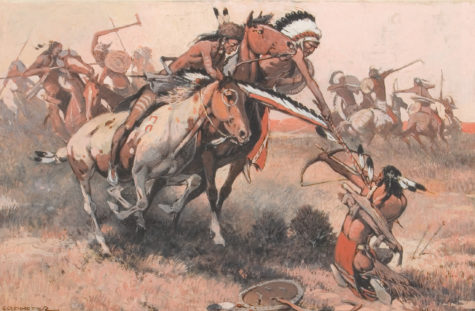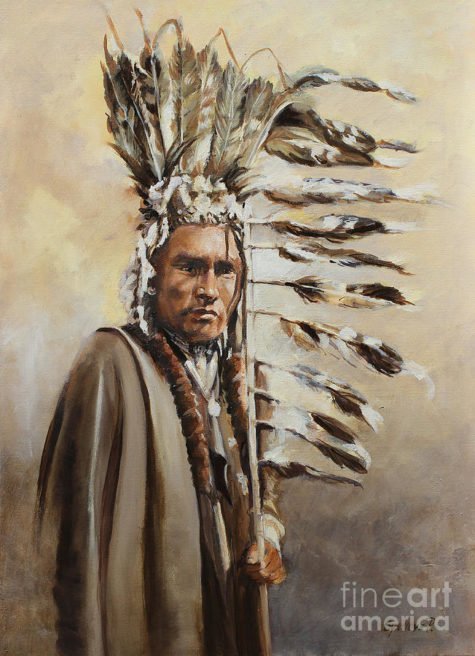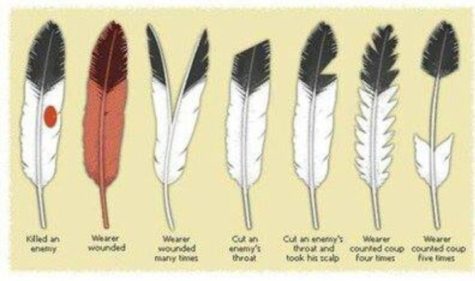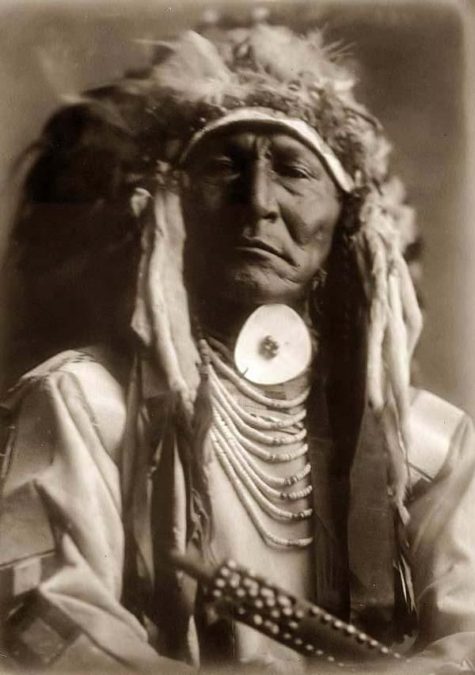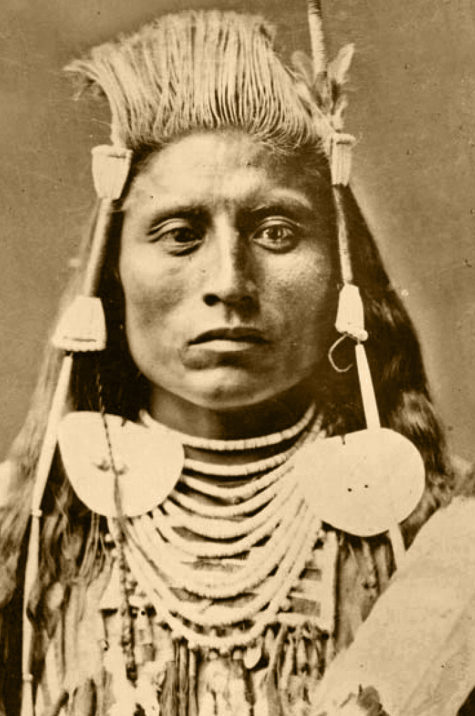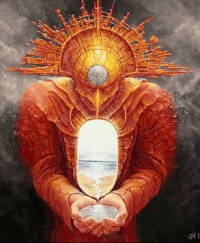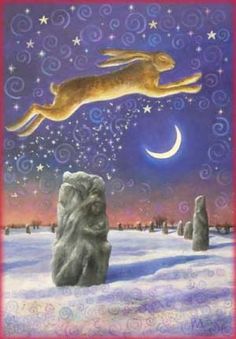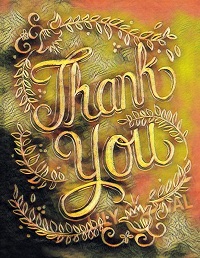Warrior
Long ago, the Great Bear wandered freely throughout the sky. His massive paws took him far across the boundless ceiling of the world. He hunted and fished, feeding there in the rivers of the sky. All throughout the first spring he did this, until his belly was full and he was happy.
Little did he know that three braves had discovered him feeding that spring and they sought his meat and pelt to feed their families in the long winter that they knew was coming.
Without warning, the braves ran out after the bear. The Great Bear took off running, trying to escape from the hunters. All through the long summer he ran, trying to get away. The braves, however, were very cunning and strong. It was in the first autumn when their arrows pierced the Great Bear and he died.
The blood of the bear spilled out of the sky and tinged all of the leaves with red and orange. The trees then dropped all of their leaves in mourning for their friend.
The Great Bear was reborn the following spring as is the way of bears, and the braves set out after him again. They do this each year. If you look into the sky and watch, you can see the three braves trailing behind the Great Bear as he runs from them towards the horizon, only to do it again with the coming of spring.
The taking of life brings serious thoughts.
We have come thus far, my brothers. We have already laid our plans. With magic power the trail is made easy, bordered with flowers, grass, and trees.
The enemy saw the apparent bounty of nature and assembled, laughing, to gather the seeds and plants. It was the power of the distant magician which made the enemy enjoy his fancied prosperity.
In the center of our council ground the fire burned and, lighting a cigarette, I puffed smoke toward the east. Slowly a vision arose before me …
On the mountain tops was a yellow-spider magician, upon where I called for help. He went to the enemy, darkened their hearts, tied their hands and their bows, and made them grow weak as women.
Then he pushed us on to destroy the enemy. We rushed upon the Apaches and killed them without difficulty.
With gladness in my heart I gathered the evidences of my victory and turned toward home.
You may think this over, my relatives. The taking of life brings serious thoughts of the waste; the celebration of victory may become riotous.
~A Pima Poem
The act of Counting Coup signifies a victory over an enemy or an accepted challenge. The Warrior Clans of Native America used many methods of stealth, guile, surprise, planning, and physical strength to claim prizes from their opponents. The Traditional prizes taken on raids were Horses, Eagle feathers, Medicine Bundles, Medicine Shields, tomahawks, bows, and other weapons. Scalps were not honorable prizes of Counting Coup before the Boat People came to Turtle Island.
Trappers and traders sold scalps to European curiosity seekers saying that the “savages” in the new world cut each other’s scalp off, when, in fact the practice of scalping was started by those who sought money from the wealthy in Europe. As the scalping horror spread and Native women and children were being killed and scalped or scalped alive, the Warrior Clans began to retaliate.
The men of any race or Tribe were of the Warrior Clan in the eyes of Native Americans and were charged with the honor of protecting women and children. It was the highest form of shame for a Warrior to have the women and children under his protection hurt in any way.
Anger and hatred began to grow on all sides, Tribe against Tribe and Indian against white. The act of Counting Coup had been soiled and the honor normally between Warriors and soldiers had been cast aside. In the original meaning, Counting Coup had been an act of victory. A Warrior would steal something from the Brave he had bested to show how strong his Medicine was against his rivals.
This practice varied among Tribes. Members of the Warrior Clan among the Plains Indians often had a Coup Staff or Stick, much like a shepherd’s crook that was placed inside his lodge and carried the reminders of his personal victories. The Coup Staff had various prizes tied to it. These objects could include Horse hair (if he had stolen the mount of another Warrior), Eagle feathers, a piece of material, beads, or a Medicine Pouch, which had been tied to the mane of an opponents Horse. Later with the practice of scalping, a scalp could also be seen hanging from a Coup Stick.
In marking a victory, there were certain things that a Brave was then allowed to do that would tell others of his Counting Coup. He could use the designs in his face paint which added honor to his status and told those who knew how to read its meaning that he had one or more acts of bravery added to his name. These symbols could also be added to his Horse’s warpaint when he rode into battle again. The more Coups Counted, the stronger the Medicine of that Warrior.
Four to six major types of Coups were Counted among the Sioux, the Crow, the Blackfoot, the Apache, the Cherokee, the Cheyenne, the Kiowa, the Flathead, the Ute, the Arapahoe, the Pawnee, the Shoshone, and others.
- The first in importance was to strike an enemy with bow and arrow, tomahawk, or later a rifle’s bullet.
- Another important Coup was “riding the enemy down.” To ride an enemy down was to knock the Warrior off his Horse and finish him off with hand-to-hand combat.
- To steal an enemy’s Horse was another important Coup. Stealing Horses was to steal the means of retaliation, and therefore, steal Warrior-power, or strength.
- The fifth was to steal some of the enemy’s Medicine, which could be his Shield, his Eagle feathers, his Medicine pouch, a beaded medallion, a Buffalo-bone chestplate, or scalplock.
A scalplock is one tiny piece of hair that is braided with some kind of Medicine representing that person’s Allies, connections, or strengths. A scalplock can have a strip of hide, a feather, a tooth, beads, and/or other small objects tied to it. To cut the braided scalplock from a Warrior’s hair was to strip him of his war medicine.
- The final recognized form of Counting Coup was to destroy a Warrior’s Lodge or Tipi, take his woman, or personal possessions. This form of Counting Coup was not as honorable and was used only as a last resort, to humiliate rather than to conquer another Warrior’s Medicine.
Among the Plains Indians, if a death occurred, the raiding party would smear black paint on their faces when returning to camp. The women would start their mourning trills and cries at the first sight of the Black Faces. The grieving family would be relieved from the duties of daily life and work for four days.
The four days of mourning honored the Winds of the Four Directions, which would take the loved one to the Sky Lodge after having “dropped his robe” (dying). If the raid was not victorious, the entire Tribe observed the death with mourning. If the Warriors had Counted Coup, the grieving family was taken care of and waited upon, but the Coup celebration would continue for the other Tribal members.
At the Coup feast, the leader of the war party or raiding band would give those who had witnessed the individual victories of their friends the honor of telling the events. A Warrior was honored by his friends and was not allowed to tell the story himself.
This practice added another dimension to the celebration since a friend’s pride in another Brother’s accomplishments came into play. This insured the participation of those who had not accomplished an act of Coup personally and made them part of the celebration as well. It also ruled out any embellishments on the part of those actually involved.
To speak in an exaggerated manner was considered prideful and to lie was to lose face. A true witness was bound by honor to speak honestly of a Brother’s courage or lack of it.
If someone had shamed the Warrior Clan, it was spoken of in the Council of that Clan and never in front of the entire Tribe. A loss of courage was a blemish on all of the Brothers of the Warrior Clan and since they acted as an elite group or unit, “shame-faces” were not allowed to continue as members.
“To add a Coup Feather to one’s Bonnet” is an expression that comes from the idea of personal achievement or accomplishment that will aid or assist the whole. In the concept of Counting Coup, jealousy and envy have no place. There is no victory when anyone is belittled through the boasting of another. There is no honor in self-importance.
Actions speak louder than words when victory is sought. A Coup Feather is never awarded to someone who intended to do something but did not follow through. Walking One’s Talk is the essence of true victory. As reflected by our Ancestors, the victory of the Coup Feather is based upon the high ideals of Eagle. Those ideals are followed by action. Just as Eagle marks and kills its prey, so must we mark and attack the weaknesses that keep us from fulfilling our words.
As Counting Coup is a personal victory that affects the whole, so is the war we wage on the old patterns that keep us from knowing world peace. These enemies can be ignorance, inner conflict, envy, jealousy, willful pride, laziness, fear, bitterness, hatred, greed, bigotry, gossip, resentment, and broken promises.
Our modern Medicine Shields are made from truth, our weapons are living that truth, and our prize is our future, bringing the healing of Earth Mother’s children. Every Two-legged has been asked to accomplish these Coups through the discovery and healing of the Self.
~Jamie Sams
In my Morning Meditation today, my teacher was a Crow warrior.
When I looked into his eyes, I saw a battlefield, I smelled the blood and the shit. He was holding up a decapitated head. Holding it by it’s hair. It was dripping blood. Other younger warriors were trilling and “counting coup”. It was a dreadful scene.
He looked at me and said:
“Be who you are.
It is very important.”
And when he said that, I realized:
Don’t be who they are, don’t be who others want you to be, don’t be someone else, don’t be who you think you should be. Be you, totally and completely you. No excuses. No regrets. And if you don’t know who you are… well, OK… you can just be “you not knowing you”.
According to Crow tradition, a man must fulfill certain requirements to become chief of the tribe: command a war party successfully, enter an enemy camp at night and steal a horse, wrestle a weapon away from his enemy and touch the first enemy fallen, without killing him. Joe Medicine Crow was the last person to meet that code, though far from the windswept plains where his ancestors conceived it.
During World War II, when he was a scout for the 103rd Infantry in Europe, he strode into battle wearing war paint beneath his uniform and a yellow eagle feather inside his helmet. So armed, he led a mission through German lines to procure ammunition. He helped capture a German village and disarmed — but didn’t kill — an enemy soldier. And, in the minutes before a planned attack, he set off a stampede of 50 horses from a Nazi stable, singing a traditional Crow honor song as he rode away.
Joseph Medicine Crow (October 27, 1913 – April 3, 2016) was a war chief, author and historian of the Crow Nation of Native Americans. His writings on Native American history and reservation culture are considered seminal works, but he is best known for his writings and lectures concerning the Battle of the Little Bighorn in 1876. He received the Bronze Star Medal and the Légion d’honneur for service during World War II, and the Presidential Medal of Freedom in 2009.
He was the last surviving war chief of the Crow Nation, and was the last living Plains Indian war chief. He was a founding member of the Traditional Circle of Indian Elders and Youth.

